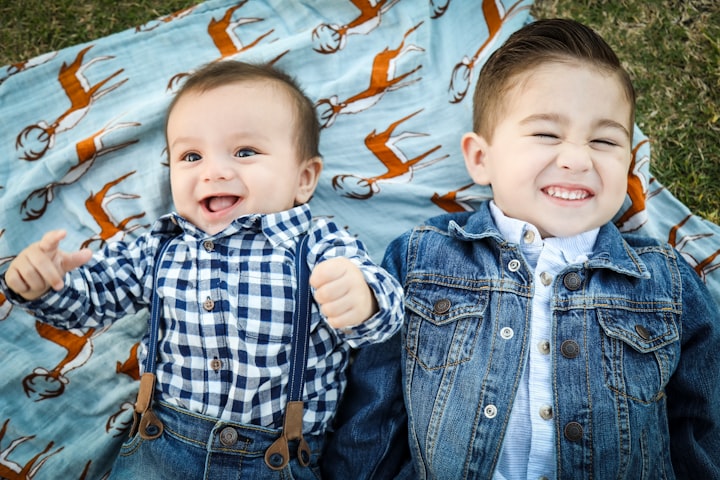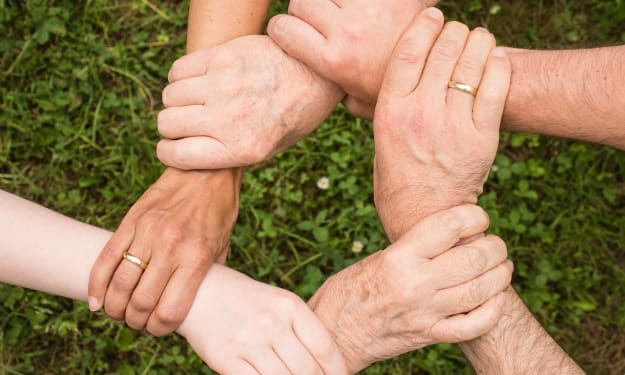The 2 year old likes to say "no", does things the other way around, and wants to run barefoot without socks, what should I do?
Mothers know these 4 methods to make their children cooperate well

If you have a 2-year-old child at home, mothers are crying out to be tossed around enough, beaten also beaten, scolded also scolded, but people can not be swords, in the end how to do?
A mother is a 2-year-old child to the gas, is intolerable, had to ask for help you have experience in the baby mother advice.
My daughter is two and a half years old, she always likes to take off her socks and run barefoot, she has said so many times, but still does not listen. Why do you struggle with the issue of wearing socks? It's because it's colder in the north, and my child used to get sick from running barefoot, so now I'm very strict with her.
When talking to her, she not only did not listen but also talked back, so I got angry and hit the soles of her feet. Later, no matter what my daughter did, she would always say, "Don't hit me, mommy".
There are some other annoying things, after eating, she threw the bowl, you count her out, and she threw it even more. If you say "no", she will say "yes, yes" or scream, always against me. I can't help it!
The 2-year-old likes to say "no", does things the other way around, and runs around barefoot without socks, what should I do?
Is this a familiar scenario? The parents who have been through this stage of their children's 2 years old, should have the same feeling, right? The problem of rebellious 2-year-old is not only recurring in parenting books, but also abounds in real life.
You're not alone in your battle with 2-year-old
The Terrible Twos, as mentioned in The Terrible Twos, occur in some children as young as 1 year and 6 months, and may last beyond the age of three in some children, but the most defiant time for any child is between the ages of two and three.

Children over the age of 2 are particularly freakish. Generally speaking, 2-year oldster-year-old in these ways: they like to say "no", throw tantrums at the drop of a hat, throw things, have to do what they want, and go against adults.
Some too many moms have cried about the horror of their children, so just pick a few.
The first mom: the child is 2 years old, it's horrible, especially when it's not making a sound. The pots and pans in the kitchen are dragging everywhere, especially loud. Barefoot running around the house, the next day there are signs of a cold. Often use your fingers to pick holes in the sofa and stuff it with things. Toys are thrown down the toilet ......
The second mom: I asked the family to get a tissue for me, but no, I had to let her get it. We turn on and off the lights, but no, we have to hold her to turn them on and off. Do not want to go to the toilet to pee, so peed on the diaper, which forced her to go to the toilet on the cry ......
2-year-old like to say "no", do things the other way around, and prefer to run barefoot without socks, what should I do?
The third baby mama: 2 years 2 months male baby, just say anything is "do not, do not go, not good", hit people throw things drop toys, reasoning he will not listen to the river lion roar. Cute when the table is bursting, naughty when the gas ......
The fourth baby mama: to what does not meet the cry, throwing things. You do some work she messed up, you said on the side! She can not hear! You then increase the tone of voice she is still indifferent! Finally, I can not help but go to the hands, yelling at her! She often says "I don't want it, I don't want it", or "I want it, I want it"!
2-year-old like to say "no", do things the other way around, and prefer to run barefoot without socks, what should I do?
In the eyes of the mother, a two-year-old is not easy to handle. When a child reaches the age of 2, it is not an isolated case, but very common, you are not alone in the battle, relax.
Why do 2-year-old always go against adults?
2-year-old rebel for reasons of their own physical and psychological development, as well as the problem of improper adult discipline.
The child's reasons are increased self-awareness, physical ability development, reaching various sensitive periods, learning mode is trial-and-error experience, etc. The child's behavior is terrible, on the other hand, if the child grows up, development is normal, and is something to rejoice about.
The main problem with adult discipline is that it always prohibits the child from doing things, but instead inspires rebellious behavior. Why is this? There are several possibilities.
2-year-old like to say "no", do things the other way around, and run barefoot without socks, what should I do?
✔ There is a misunderstanding of forbidden orders
We are used to saying "no, can't do, no go" to our children, trying to convey the meaning of forbidding them to do something, but the child's language development is not perfect, he can not fully understand the meaning of these words, subconsciously ignore these words, but think that "no" The word after the word "no" is what the parent means.
For example, if we tell a child "No climbing on the stool", the child thinks he can climb on the stool and does so.
What should we do if our 2-year-old likes to say "no" and does things the other way around, preferring to run barefoot without socks?
✔ The prohibition order may be a cue
Daniel Wigner, a social psychologist at Harvard University, conducted an experiment in which he asked the test subjects not to imagine a white bear, but anything else. As a result, the test subjects always thought of white bears, and the image became more and more clear.
This is the famous "white bear effect", the more children are forbidden to do something, the more likely they are to do something.
For example, if a child is carrying a plate and you tell him "don't break the plate", the child will always think about what it would be like to break the plate, and when he thinks about it, the plate falls to the ground and breaks.
2-year-old like to say "no", do things the other way around, and run barefoot without socks, what should I do?
✔ Forbidden orders may stimulate the child's curiosity
There is a "forbidden fruit effect" in psychology, also known as the "Adam and Eve effect", Eve was forbidden to eat the fruit of the mysterious wisdom tree, but instead aroused Eve's curiosity, the result of stealing the forbidden fruit, Eve was relegated to earth.
That is to say, the more forbidden things are, the more people want to get their hands on them. Because people have curiosity and rebelliousness, perhaps it is better to be forbidden.
For example, if you do not let your child throw the bowl, he will throw it, he does not know the consequences of breaking it but think that the process is very beautiful, throwing a parabola, making a "ban" sound, very novel.
2-year-old like to say "no", do things the other way around, and prefer to run barefoot without socks.
These are some of the reasons why our discipline fails and we don't know what the problem is, which is why it's so crazy.
Moms know these 4 ways to get their kids to behave and cooperate
Moms and dads may be confused, children doing the wrong thing, is not forbidden, then how do make children do the right thing? There is also a way, that is to follow the laws of child development so that the child knows exactly what to do, feels fun and interested, and the child naturally accepted.
First, use more positive language and less prohibitive language
If you don't allow your child to do something, your child often misunderstands, so let's use less forbidden language and less positive language instead. It is to tell the child exactly how to do it so that the child can understand the correct approach, and easily follow the instructions.
For example, if a child is barefoot without socks, instead of saying, "Don't run around the house barefoot," we say, "Put on your socks and run again," and the child will understand that he or she needs to put on socks. When a child throws a bowl, instead of saying "don't throw the bowl", we say "put the bowl on the table" or "take the bowl to the kitchen". When the child does so, we applaud him and reinforce his correct behavior, and the child is more willing to follow instructions.
2-year-old like to say "no" and do things the other way around, preferring to run barefoot without socks, what should we do?
Second, more experience, less reasoning
2-year-old don't understand the reasoning, so it's useless to talk about it. Children's learning mode is trial-and-error verification, hands-on, practical experience, and more attention to the matter at hand. The only way a child will stop is if he has first-hand experience that doing something is bad for him.
For example, if a child does not like to wear socks and is told that he will get sick if he goes barefoot, he feels it is too far away to listen. Children have sensitive soles and may be more afraid of pinching their feet. You can find some obstacles, like rocks, and let your child walk on them with bare feet and socks on, to experience which feels better, so your child can make a judgment.
2-year-old like to say "no", do things the other way around, and prefer to run barefoot without socks, what should I do?
Third, do more games, less verbal
Psychologists believe that play is the best way for children to learn. We talk to the child's mouth dry, why not do a game with the child, so that the child will be happy?
For example, to get the child to put on socks, we can role-play with the child by running around the house with the child and catching whoever gives the other the socks. If the mother catches the child, the child puts socks on the mother, and if the child catches the mother, the mother puts socks on the child. Taking turns putting on socks is fun and interesting, and the child is hooked.
2-year-old like to say "no" and do things the other way around, they want to run barefoot without socks.
Fourth, read more picture books, less reprimand
Children like to listen to stories and imitate, so you can read picture books about wearing socks with your child, and your child can easily accept them.
If the socks are left unused, the socks are worn on hangers, bananas, cacti, and umbrellas, which is especially fun. You can prepare some different styles of socks for your child and play with them in different ways to make them like socks and enjoy wearing them.
What should I do if my 2-year-old likes to say "no" does things the other way around, and wants to run barefoot without socks?
Conclusion
The phenomenon of rebellious 2-year-old children is very common and is a symbol of the growth of children, but also with the way adults discipline, and want to make children obediently accept our discipline, we need to take some new strategies.
About the Creator
Alessandro Algardi
"She was a girl who knew how to be happy even when she was sad” and that's important you know.






Comments
There are no comments for this story
Be the first to respond and start the conversation.